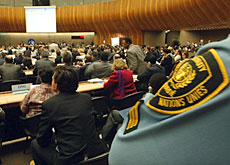Swiss hail new UN human rights body
Switzerland has praised the decision by the United Nations to create a Human Rights Council as a major step forward for the protection of victims.
The new body, which will replace the Geneva-based Human Rights Commission, was adopted by an overwhelming majority of member states despite opposition from the United States.
Foreign Minister Micheline Calmy-Rey spoke of her “profound joy” on hearing the news that the council – the result of a Swiss initiative – had been accepted on Wednesday. She said it was a victory for human rights and a triumph for Swiss diplomacy.
The foreign ministry said Switzerland would apply for a seat on the new body. Members will be elected on May 9.
The US was one of only four countries to come out against the council when it was put to a vote before the General Assembly in New York. There were three abstentions.
John Bolton, US ambassador to the UN, said Washington did not have sufficient confidence in the text to be able to back it.
“That said, the United States will work cooperatively with other member states to make the council as strong and effective as it can be,” he said.
Regret
Calmy-Rey regretted that the US had voted against the council but said she was convinced that Washington was ready to cooperate.
She said this was crucial in view of the US’s important role within the UN system and in the field of human rights.
The council will replace the Human Rights Commission, which was set up in 1946 and meets annually in Geneva for a six-week session.
The 53-member commission has been widely criticised for allowing some of the worst violators to escape condemnation. Current members include Cuba, Sudan and Zimbabwe.
The 47-strong council, which is expected to sit for the first time in Geneva on June 19, will be elected by an absolute majority of the 191-member General Assembly.
It will meet at least three times a year for a minimum of ten weeks, with the possibility of calling emergency sessions. Members found guilty of gross human rights violations can be kicked off the council by a two-thirds majority of the General Assembly.
Major flaws
But this failed to assure the US, which had described the draft resolution as flawed and “unacceptable”. It wanted the two-thirds majority rule applied to the election of members in order to keep out abusers. It also lobbied for a smaller body of around 30 countries.
The US had called for negotiations on the text to be reopened but Jan Eliasson, president of the General Assembly, said this would open a “Pandora’s Box” – a view shared by Switzerland.
Despite frantic high-level diplomatic efforts to persuade the US to shift its position, Washington stuck to its guns.
Presenting the draft resolution on Wednesday, Eliasson described it as “a unique opportunity to make a fresh start for human rights”. He said no member state had got exactly what it wanted and many had made compromises on a number of points.
Iain Levine, programme director for Human Rights Watch, told swissinfo that the establishment of the new body represented a major advance for the protection of human rights worldwide.
“But it’s the first day of a new beginning and in many ways the work starts now,” he said.
swissinfo, Adam Beaumont
The Human Rights Council will be based in Geneva and answer directly to the General Assembly, giving it more authority than the existing commission.
It will be made up of 47 countries elected by an absolute majority of the 191-member General Assembly. The council will carry out periodic “peer reviews” of the human rights situation in member countries.
The General Assembly can, by a two-thirds majority, suspend council members found guilty of gross human rights violations.
The council will meet at least three times a year and can call emergency sessions at times of crisis.
The Human Rights Council is the result of a Swiss initiative.
UN Secretary-General Kofi Annan made it a key element of his reform package in March 2005.
Jan Eliasson, president of the UN General Assembly, led negotiations for the new body.
It will replace the Human Rights Commission, which was set up in 1946 and meets once a year in Geneva for six weeks.

In compliance with the JTI standards
More: SWI swissinfo.ch certified by the Journalism Trust Initiative

You can find an overview of ongoing debates with our journalists here. Please join us!
If you want to start a conversation about a topic raised in this article or want to report factual errors, email us at english@swissinfo.ch.